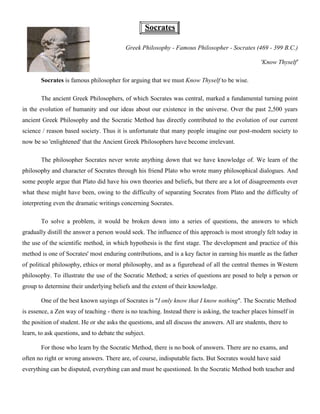
Socrate
- 1. Socrates Greek Philosophy - Famous Philosopher - Socrates (469 - 399 B.C.) 'Know Thyself' Socrates is famous philosopher for arguing that we must Know Thyself to be wise. The ancient Greek Philosophers, of which Socrates was central, marked a fundamental turning point in the evolution of humanity and our ideas about our existence in the universe. Over the past 2,500 years ancient Greek Philosophy and the Socratic Method has directly contributed to the evolution of our current science / reason based society. Thus it is unfortunate that many people imagine our post-modern society to now be so 'enlightened' that the Ancient Greek Philosophers have become irrelevant. The philosopher Socrates never wrote anything down that we have knowledge of. We learn of the philosophy and character of Socrates through his friend Plato who wrote many philosophical dialogues. And some people argue that Plato did have his own theories and beliefs, but there are a lot of disagreements over what these might have been, owing to the difficulty of separating Socrates from Plato and the difficulty of interpreting even the dramatic writings concerning Socrates. To solve a problem, it would be broken down into a series of questions, the answers to which gradually distill the answer a person would seek. The influence of this approach is most strongly felt today in the use of the scientific method, in which hypothesis is the first stage. The development and practice of this method is one of Socrates' most enduring contributions, and is a key factor in earning his mantle as the father of political philosophy, ethics or moral philosophy, and as a figurehead of all the central themes in Western philosophy. To illustrate the use of the Socratic Method; a series of questions are posed to help a person or group to determine their underlying beliefs and the extent of their knowledge. One of the best known sayings of Socrates is "I only know that I know nothing". The Socratic Method is essence, a Zen way of teaching - there is no teaching. Instead there is asking, the teacher places himself in the position of student. He or she asks the questions, and all discuss the answers. All are students, there to learn, to ask questions, and to debate the subject. For those who learn by the Socratic Method, there is no book of answers. There are no exams, and often no right or wrong answers. There are, of course, indisputable facts. But Socrates would have said everything can be disputed, everything can and must be questioned. In the Socratic Method both teacher and
- 2. student come to the discussion naked of preconceptions. Socrates said that to believe one knew anything at all for certain was dangerous and hampered freedom of exploration in a subject. So the teacher comes as questioner. Instead of telling the student what words mean, for example, the teacher asks the student questions designed to allow the student to use their own curiosity and intelligence to find the answers. The Socratic Method is not for the teacher who wants to impart knowledge and have the students listen respectfully. The teacher needs the humility to allow the students to explore and reach understanding without imposing his or her own opinions. For my opinion about the Socratic Method is the helpful one for both teachers and students. Especially, it can give students the chance to experience the excitement of academic discovery on their own. Because of this method, the teacher is knowledgeable and proficient enough to spontaneously ask questions in order to draw conclusions, principles, or answers from the students.
